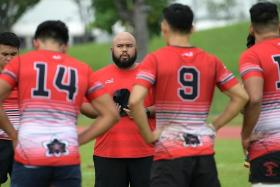Fijian rugby sevens hits new high
But with English coach's departure, there is worry about Olympic gold medallists' renewed status
COMMENT
Fijian rugby has always been admired worldwide because of its lofty position in the South Pacific and Australasia.
In fact, like cricket in India or table tennis in China, rugby is a religion in Fiji.
Cast your eyes on any open patch of land, and you will see kids chasing an oval ball.
And the national league is in a healthy state with tight matches witnessed by sell-out crowds.
Rugby hit a new high in world sport in August when the Fijians won the Rugby Sevens Olympic gold medal in Rio in stunning fashion.
They ran riot against Great Britain in the Olympic final, racing away to a resounding 43-7 triumph with an exhibition of stunning rugby.
Singapore had a taste of Fijian rugby way back in the Sixties when the legendary Joe Levula made his appearance here.
At the Jalan Besar Stadium, Levula, with a muscular 1.95m frame, raced away with the speed of an Olympic sprint finalist to amass tries with consummate ease.
The megastar was popularly known as the Flying Levula because of his bolting bursts in the range of 9.72sec for the 100 yards on grass, then a world top-10 time.
The dashing Fijian had an unorthodox running style, marked by a rhythmic foot-thrusting movement that gobbled up metres of space in a blink of an eye.
Levula, who worked as a cane (sugar cane) cutter before switching to serious rugby, also played semi-professional rugby in Britain.
It is said that he died 10 years ago in Australia, and Fiji and world rugby mourned the loss of a model athlete.
It was with the same traits - a mixture of speed, cunning and combination - that the Fijians raced away to Olympic glory.
It is almost two months since the historic gold - the first for Fiji - but the wild celebrations are still ongoing.
The players, led by skipper Osea Kolinisau and rallied by star player Samisoni Viriviri, were given a tremendous homecoming.
Large parts of the Pacific paradise came to a standstill and a motorcade parade along the streets of Nadi, where the airport is situated, drew thousands of fans.
A public holiday was declared, further celebrations at the capital Suva were held and the Companion of the Order of Fiji honour was bestowed on the team coach Englishman Ben Ryan.
The players were honoured as Officers of the Order of Fiji, and each received a US$14,700 ($20,000) bonus.
While in Fiji last week, I witnessed further celebrations where the rugby players turned up at the Fiji International golf tournament daily for autograph-signing and photograph sessions.
And at Fiji Day last Monday, the team were taken in cars around the National Stadium in Suva where a 25,000 crowd turned up.
No doubt, Fiji, as back-to-back winners of the World Rugby Sevens for the last two seasons and multi-winners of the popular Hong Kong Sevens, are at the pinnacle of the sport.
And they will delight Singapore fans yet again when they turn up for the World Sevens at the National Stadium next April.
So what is it about Fijian rugby that has enticed the world?
Singapore Rugby Union president Low Teo Ping, a close friend of coach Ryan, said: "It is about blinding speed, slick ball possession and passing and changing tactical manoeuvres with an uncanny ability to hold the ball longer than expected.
"At one time, they used to release the ball sooner, but Ryan has drilled in them the confidence to clutch-hold the ball longer so that passes could be more accurate."
Ryan, 45, labelled the rugby messiah and a god-send, had overcome the "potholes and unpaved surfaces" in the "Flying Fijians" glory road to Rio and beyond.
Financial problems, indiscipline, politics within the rugby union had hit the team only months before the Olympics.
But Ryan persevered with his monumental task despite being unpaid for five months.
The ginger-haired genius also ensured that the players believed in the Olympic dream, which allowed them to take his punishing training.
Fiji's Olympic team captain Kolinisau said: "We had a lot of pressure, but with Ryan's training where he pushed us to our physical limits, we could cope.
"Our fitness was supreme, and this one factor allowed us to manage the pressure because we were able to do what we wanted."
On a physical level, Ryan banked on physiotherapist Willie Keong, along with fitness expert and former sevens star Nacanieli Cawanibuka, to hone the team into shape.
Diet was paramount and the players fed on fresh vegetables, fruit, lean meat, lots of yaqona drinking and the occasional swipe of alcohol.
Ryan also made use of the age-old Sigatoka Dunes, where he made the players build endurance as they went through the paces of uphill running through the heavy sand.
Now that Ryan has returned home and their union desperately seek his replacement, there are fears whether Fiji's sevens rugby can maintain its peak.
Get The New Paper on your phone with the free TNP app. Download from the Apple App Store or Google Play Store now


